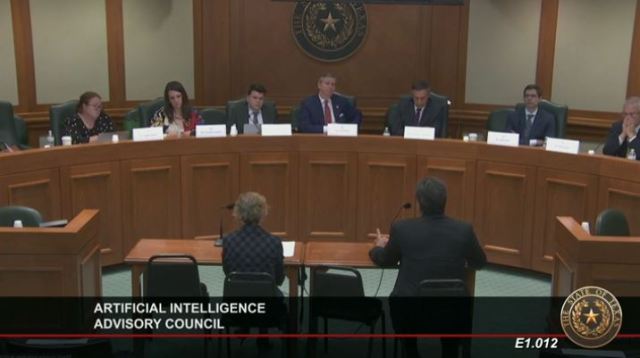Four companies based in Texas provided detailed descriptions of their current utilization of artificial intelligence in their operations and potential future applications during the latest meeting of the state’s AI advisory committee on Thursday. The committee, established recently, aims to compile an overview of the utilization of advanced technologies by state agencies.
Representatives from the Texas Department of Information Resources, the Texas Department of Transportation, the Texas Workforce Commission, and the Teacher Retirement System of Texas presented their insights to the seven-member panel. State Rep. Giovanni Capriglione, R-Southlake, who co-chairs the advisory committee, mentioned to KXAN that the participants were requested to present evidence during the meeting. In the prior legislative session, he spearheaded the House’s initiatives in passing the legislation that formed this new division last year.
Prospects for Artificial Intelligence Development in Texas
Anh Selissen, the chief knowledge officer at TxDOT, discussed the company’s gradual yet innovative approach to AI implementation. She highlighted a pilot initiative focused on AI event recognition aimed at identifying potential health hazards in construction and maintenance sites. This technology is designed to enhance event notification speed, response efficiency, and issue coverage.
Selissen emphasized the positive impact on incident reporting speed on Austin roads, where the project is currently under evaluation, reducing response times by five to ten minutes. The committee co-chairs, who are also legislative members, expressed their admiration for this progress.
The goal is to expand the application of this AI incident detection software across the board, she added.
Members from the Teacher Retirement System informed the council that they are in the early stages of AI adoption and have not disclosed specific details yet. However, the organization unveiled a plan in October related to AI and established a review team to assess potential tools and applications moving forward.
They clarified that AI would not be utilized for decision-making but rather for data training and augmentation to support human decision-makers.
Legislative Requirements
The State’s Artificial Intelligence Advisory Council was established through House Bill 2060, signed into law recently by the governor. Capriglione, the bill’s author, might assume the role of agency co-chair after being appointed by House Speaker Dade Phelan. Lt. Gov. Dan Patrick appointed Texas Sen. Tan Parker, R-Flower Mound, as the other co-chair.
Governor Greg Abbott appointed four additional members to the council, including John Bash, a lawyer, and Dean Teffer, a security expert, both from Austin. The other appointees are Mark Stone, the chief knowledge officer at Texas A&M University, and Angela Wilkins, the senior director of the Ken Kennedy Institute at Rice University.
Capriglione mentioned to KXAN that the government plans to conduct monthly meetings, occasionally opening them to input from the public.
As per the legislation, every Texas company must submit an automatic decision systems inventory report by July 1. These reports will outline all automatic decision systems being developed, utilized, or acquired by the agency, as mandated by the law.
The AI advisory committee will review these reports from state agencies and present their findings to state legislators. By December 1, the committee must convene and prepare a report for the state legislature addressing various issues, such as the use of automatic systems by state agencies, the necessity of an AI code of ethics, and required policy recommendations. The timing is crucial, as it aligns with the period following the November general election and preceding the January legislative session.
Per the legislation, the advisory committee will conclude its operations on January 1, 2025, unless further legislation is introduced in the subsequent session to advance this focused AI initiative.










